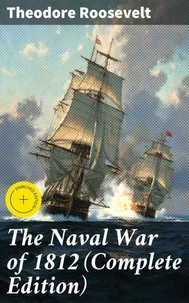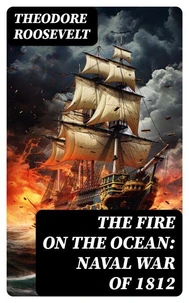The Naval War of 1812. Historical Account of the Conflict between the United States and the United Kingdom
Par :Formats :
Disponible dans votre compte client Decitre ou Furet du Nord dès validation de votre commande. Le format ePub est :
- Compatible avec une lecture sur My Vivlio (smartphone, tablette, ordinateur)
- Compatible avec une lecture sur liseuses Vivlio
- Pour les liseuses autres que Vivlio, vous devez utiliser le logiciel Adobe Digital Edition. Non compatible avec la lecture sur les liseuses Kindle, Remarkable et Sony
 , qui est-ce ?
, qui est-ce ?Notre partenaire de plateforme de lecture numérique où vous retrouverez l'ensemble de vos ebooks gratuitement
Pour en savoir plus sur nos ebooks, consultez notre aide en ligne ici
- Nombre de pages359
- FormatePub
- ISBN859-65--4776414-4
- EAN8596547764144
- Date de parution25/12/2023
- Protection num.Digital Watermarking
- Taille2 Mo
- Infos supplémentairesepub
- ÉditeurDIGICAT
Résumé
In "The Naval War of 1812, " Theodore Roosevelt delivers a meticulous and passionately researched account of the maritime conflicts between the United States and Great Britain during the War of 1812. Composed in an accessible yet scholarly prose, Roosevelt's work not only chronicles key naval engagements but also contextualizes them within the broader frame of America's burgeoning identity as a naval power.
His narrative interweaves strategic analysis with vivid descriptions, offering insights into the tactics, ships, and influential personalities that defined this pivotal era in American history. Theodore Roosevelt, known for his dynamic leadership as the 26th President of the United States, possessed a lifelong fascination with military history, which profoundly shaped his worldview. His experiences as a soldier and his strong advocacy for a robust naval presence informed his writing.
This passion for naval strategy and history is evident as he draws upon both primary sources and contemporary accounts, lending authenticity and depth to his analysis, while simultaneously echoing his belief in the importance of naval readiness for national security. "The Naval War of 1812" is essential reading for those interested in the evolution of American military history and maritime strategy.
Roosevelt's authoritative narrative will not only engage history enthusiasts but also inspire modern readers to appreciate the complexities of naval warfare and its critical role in shaping American sovereignty.
His narrative interweaves strategic analysis with vivid descriptions, offering insights into the tactics, ships, and influential personalities that defined this pivotal era in American history. Theodore Roosevelt, known for his dynamic leadership as the 26th President of the United States, possessed a lifelong fascination with military history, which profoundly shaped his worldview. His experiences as a soldier and his strong advocacy for a robust naval presence informed his writing.
This passion for naval strategy and history is evident as he draws upon both primary sources and contemporary accounts, lending authenticity and depth to his analysis, while simultaneously echoing his belief in the importance of naval readiness for national security. "The Naval War of 1812" is essential reading for those interested in the evolution of American military history and maritime strategy.
Roosevelt's authoritative narrative will not only engage history enthusiasts but also inspire modern readers to appreciate the complexities of naval warfare and its critical role in shaping American sovereignty.
In "The Naval War of 1812, " Theodore Roosevelt delivers a meticulous and passionately researched account of the maritime conflicts between the United States and Great Britain during the War of 1812. Composed in an accessible yet scholarly prose, Roosevelt's work not only chronicles key naval engagements but also contextualizes them within the broader frame of America's burgeoning identity as a naval power.
His narrative interweaves strategic analysis with vivid descriptions, offering insights into the tactics, ships, and influential personalities that defined this pivotal era in American history. Theodore Roosevelt, known for his dynamic leadership as the 26th President of the United States, possessed a lifelong fascination with military history, which profoundly shaped his worldview. His experiences as a soldier and his strong advocacy for a robust naval presence informed his writing.
This passion for naval strategy and history is evident as he draws upon both primary sources and contemporary accounts, lending authenticity and depth to his analysis, while simultaneously echoing his belief in the importance of naval readiness for national security. "The Naval War of 1812" is essential reading for those interested in the evolution of American military history and maritime strategy.
Roosevelt's authoritative narrative will not only engage history enthusiasts but also inspire modern readers to appreciate the complexities of naval warfare and its critical role in shaping American sovereignty.
His narrative interweaves strategic analysis with vivid descriptions, offering insights into the tactics, ships, and influential personalities that defined this pivotal era in American history. Theodore Roosevelt, known for his dynamic leadership as the 26th President of the United States, possessed a lifelong fascination with military history, which profoundly shaped his worldview. His experiences as a soldier and his strong advocacy for a robust naval presence informed his writing.
This passion for naval strategy and history is evident as he draws upon both primary sources and contemporary accounts, lending authenticity and depth to his analysis, while simultaneously echoing his belief in the importance of naval readiness for national security. "The Naval War of 1812" is essential reading for those interested in the evolution of American military history and maritime strategy.
Roosevelt's authoritative narrative will not only engage history enthusiasts but also inspire modern readers to appreciate the complexities of naval warfare and its critical role in shaping American sovereignty.










